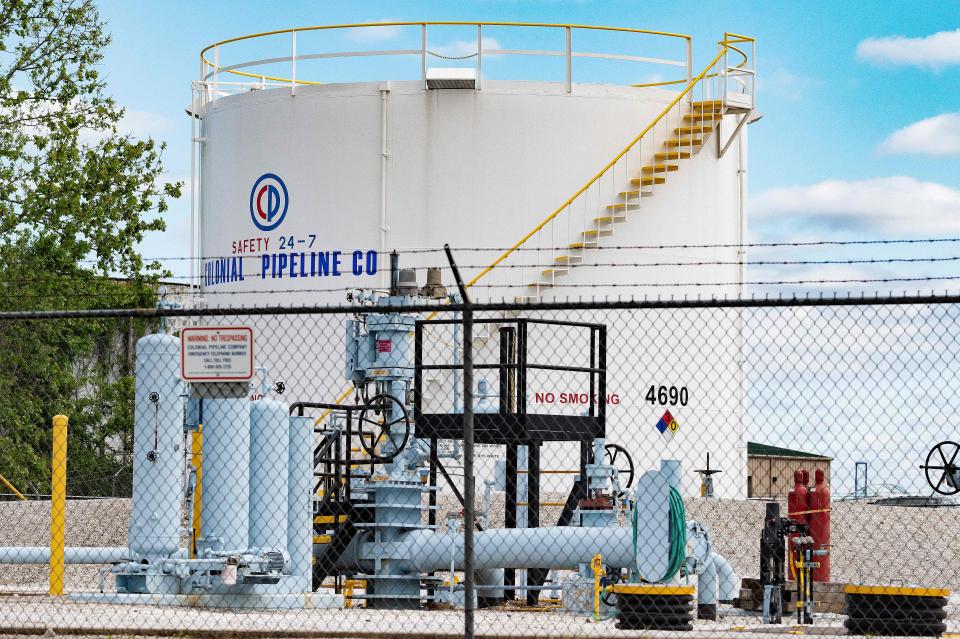Fact check: Colonial Pipeline gas shortage was result of cyberattack by hackers
The claim: Colonial Pipeline gas shortage was intentional
In response to the Colonial Pipeline hack, many Americans along the East Coast flocked to gas stations to panic buy fuel. On social media, some users promoted baseless claims that the gas shortage was intentional.
“I'm not buying this ‘cyber attack’. Right before vacation season? Ya no this is a ploy,” read a May 10 post.
“There ARE no coincidences! This intentional ‘Gas shortage’ is by design. Next thing will be FOOD if we don’t do something FAST!” claimed a May 11 Facebook post.
“Let me get this straight. Suddenly, going into summer vacation season, there’s an unheard of cyber attack that totally shuts down ⅓ of the countries gas supply (almost all red states with no COVID restrictions) - and the Biden regime is blaming Russia?” said another May 11 post.
Fact check: Viral image of plastic bags filled with gas is from 2019
The pipeline's closure was the result of a cyberattack on the company that operates it. There is no evidence to suggest it is part of a larger plan.
USA TODAY reached out to several of the posters for comment. None responded.
Hackers target Colonial Pipeline Co.
On May 8, Colonial Pipeline Co. announced it had been the victim of a ransomware attack that affected its information technology systems.
Ransomware attacks are cybercrimes in which hackers encrypt an organization's data and demand ransom payments for returned control. These cyberattacks typically target corporations, however, several hospitals, local governments and states have been victims of ransomware attacks over the past year.

“In response to the cybersecurity attack on our system, we proactively took certain systems offline to contain the threat, which temporarily halted all pipeline operations, and affected some of our IT systems,” Colonial Pipeline said in a May 10 statement. "To restore service, we must work to ensure that each of these systems can be brought back online safely.”
Fact check: Posts draw misleading comparison between Colonial Pipeline hack and unfounded election fraud claims
The offline pipeline caused gas shortages in many communities along the East Coast. In a May 13 statement, Colonial Pipeline announced it has made “substantial progress” in its efforts to restart its system.
Energy industry experts told USA TODAY the gas supply issues should stabilize soon.
Colonial Pipeline declined USA TODAY's request for comment.
The FBI said ransomware created by cybercrime group DarkSide had been responsible for the Colonial Pipeline attack. CNBC reported that DarkSide develops and sells ransomware software to other criminals that then carry out attacks.
Fact check: Yes, viral photo shows gas hoarding in Alabama after Colonial Pipeline hack
Our rating: False
We rate the claim that the Colonial Pipeline gas shortage was intentional FALSE because it is not supported by our research. An FBI investigation found the gas shortage was the result of a ransomware attack by cybercrime organization DarkSide against Colonial Pipeline.
Our fact-check sources:
USA TODAY, May 12, Gasoline in plastic bags? Panic buying after Colonial Pipeline cyberattack won't solve the problem, experts say.
Colonial Pipeline Company, accessed May 13, Media Statement Update: Colonial Pipeline System Disruption
Associated Press, May 10, Major fuel pipeline halts operations after cyber attack. Will temporary outage cause gas shortage, price hikes?
USA TODAY, May 13, When will gas return? Is it safe to take a road trip? Your questions about gas shortage answered.
Federal Bureau of Investigation, May 10, FBI Statement on Compromise of Colonial Pipeline Networks
CNBC, May 10, Here’s the hacking group responsible for the Colonial Pipeline shutdown
Thank you for supporting our journalism. You can subscribe to our print edition, ad-free app or electronic newspaper replica here.
Our fact check work is supported in part by a grant from Facebook.
This article originally appeared on USA TODAY: Fact check: False claim Colonial Pipeline gas shortage was intentional

